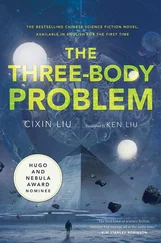“If God really exists, then he may have a mouthpiece in the mortal world.”
They all stared at him for ages before they understood the implication of his words. Then one astronomer said, “General, what are you talking about? God wouldn’t choose a mouthpiece from an atheist nation.”
Fitzroy ground out his cigarette end and spread out his hands. “When you have eliminated the impossible, whatever remains, no matter how improbable, must be the truth. Can you think of a better explanation?”
Ringier mused, “If by ‘God’ you mean a force of justice in the universe that transcends everything—”
Fitzroy stopped him with a raised hand, as if the divine power of what they had just learned would be reduced if it were stated outright. “So believe, all of you. You can now start believing.” And then he made the sign of the cross.
* * *
The trial run of Tianti III was airing on television. Construction on three space elevators had begun five years ago, and since Tianti I and Tianti II had been put into operation at the start of the year, the test of Tianti III did not cause much of a commotion. All space elevators were currently being built with just a single primary rail, giving them a far smaller carrying capacity than the four-rail models still under design, but this was already an altogether different world from the age of chemical rockets. Setting aside construction, the cost of going into space by elevator was substantially lower than by civilian aircraft. This in turn had led to an increase in the number of bodies in motion in Earth’s night sky: These were humanity’s large-scale orbiting structures.
Tianti III was the only space elevator based on the ocean. Its base was located on the Equator on an artificial floating island in the Pacific Ocean that could navigate at sea under its own nuclear power, which meant that the elevator’s position on the Equator could be adjusted if necessary. The floating island was a real-life version of the Propeller Island Jules Verne had described, and so it had been dubbed “Verne Island.” The ocean wasn’t even visible on the television, which was showing a shot of a metal, pyramid-shaped base surrounded by a steel city, and—at the bottom of the rail—the cylindrical transport cabin that was ready to launch. From this distance, the guide rail extending into space was invisible due to its sixty-centimeter diameter, although at times you could catch a glint of reflected light from the setting sun.
Three old men, Zhang Yuanchao and his two old neighbors, Yang Jinwen and Miao Fuquan, were watching this on television. All of them were now past seventy, and while no one would call them doddering, they were now definitely old. For them, recalling the past and looking toward the future were both burdens, and since they were powerless to do anything about the present, their only option was to live out their waning years without thinking about anything in this unusual era.
Zhang Yuanchao’s son Zhang Weiming led his grandson Zhang Yan through the door. He was carrying a paper sack, and said, “Dad, I’ve picked up your ration card and your first batch of grain tickets.” Then he took out a pack of colorful tickets from the bag and gave them to his father.
“Ah, just like in the old days,” Yang Jinwen said, as he watched from the side.
“It’s come back. It always comes back,” Zhang Yuanchao murmured emotionally to himself, as he took the tickets.
“Is that money?” asked Yan Yan, looking at the bits of paper.
Zhang Yuanchao said to his grandson, “It’s not money, child. But, from now on, if you want to buy nonquota grain, like bread or cake, or want to eat at a restaurant, you’ll need to use these along with money.”
“This is a little different from the old days,” Zhang Weiming said, taking out an IC card. “This is a ration card.”
“How much is on it?”
“I get twenty-one and a half kilos, or forty-three jin . You and Xiaohong get thirty-seven jin , and Yan Yan gets twenty-one jin .”
“About the same as back then,” the elder man said.
“That should be enough for a month,” Yang Jinwen said.
Zhang Weiming shook his head. “Mr. Yang, you lived through those days. Don’t you remember? It might be fine now, but very soon there’ll be fewer nonstaples, and you’ll need numbers to buy vegetables and meat. So this paltry bit of grain really won’t be enough to eat!”
“It’s not that serious,” Miao Fuquan said with a wave of his hand. “We’ve been through times like these a few decades ago. We won’t starve. Drop it, and watch TV.”
“Oh, and industrial coupons [1] Translator’s Note: China instituted a ration system for grain and cooking oil in the early 1950s, and expanded it in 1961 to include goods ranging from shoes and scissors to home appliances and electronics. With the transition from planned economy to market economy in the 1980s, use of the ration system declined, and it was terminated in the early 1990s.
may be coming soon, too,” Zhang Yuanchao said, putting the grain tickets and ration card on the table and turning his attention to the television.
On the screen, the cylindrical cabin was rising from the base. It ascended quickly and accelerated rapidly, then disappeared into the evening sky. Because the guide rail was invisible, it looked like it was ascending on its own. The cabin could reach a maximum speed of five hundred kilometers per hour, but even at that speed it would take sixty-eight hours to reach the space elevator’s terminus in geostationary orbit. The scene cut to a downward-facing camera installed beneath the cabin. Here, the sixty-centimeter rail occupied the larger part of the screen. Its slick surface made motion practically undetectable, except for the fleeting scale markings that showed the camera’s upward velocity. The rail quickly tapered into nothing as it extended downward, but it pointed at a spot far below where Verne Island, now visible in total, seemed like a giant platter suspended from the lower end of the rail.
Something occurred to Yang Jinwen. “I’ll show you two a real rarity,” he said, as he got up and walked somewhat less nimbly out the door, perhaps to his own home. He soon returned with a thin slice of something about the size of a cigarette box and laid it on the table. Zhang Yuanchao picked it up and looked at it: The object was gray, translucent, and very lightweight, like a fingernail. “This is the material Tianti is made out of!” Yang Jinwen said.
“Great. Your son stole strategic materials from the public sector,” Miao Fuquan said, pointing at the slice.
“It’s just a leftover scrap. He said that when Tianti was under construction, thousands upon thousands of tons of this stuff was shot into space, and it was made into the guide rail there and then hung back down from orbit again…. Soon, space travel will be popularized. I’ve asked my son to hook me up with business in that area.”
“You want to go to space?” asked Zhang Yuanchao, surprised.
“It’s not such a big deal. I’ve heard there’s not even hypergravity when you go up. It’s just like taking a long-distance sleeper train,” Miao Fuquan said dismissively. In the many years he had been unable to operate his mines, his family had gone into decline. He had sold off his villa four years ago, leaving this as his only residence. Yang Jinwen, whose son worked on the space elevator project, had in a single bound become the wealthiest of the three, and this sometimes made old Miao jealous.
“I’m not going to space,” Yang Jinwen said, looking up, and when he saw that Weiming had taken the boy to another room, he went on. “But my remains will. Hey, you two fellows don’t have any taboos about talking about this, do you?”
Читать дальше












